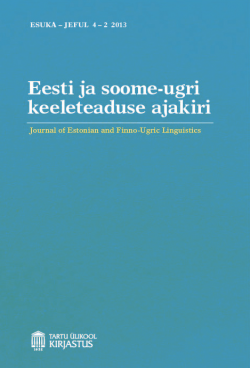From code-switching to a mixed code: the role of parenthetical verbs in the emerging Polish-Russian mixed code in Lithuania
DOI:
https://doi.org/10.12697/jeful.2013.4.2.04Keywords:
code-switching, emerging mixed codes, parenthetical verbs, fusion, Polish, RussianAbstract
This paper investigates the role of parenthetical verbs in the emerging Polish-Russian mixed code in Lithuania. Parenthetical verbs share many similarities with discourse markers, since both are regarded as having little or no meaning and occurring outside the syntax of the utterance. The data analysis, based on recordings of spontaneous conversations in the Polish community in Lithuania, aims to test two hypotheses with regard to Russian parenthetical verbs in order to establish whether they should be treated as lexical elements that have been “fused” into the Polish-Russian mixed code, or as instances of ad-hoc switches triggered by identifiable factors. The data reveals that both options are permitted, which in turn suggests that fusion around parenthetical verbs has been “synchronically licensed” (Matras 2000: 525), in the sense that speakers have abolished the requirement to maintain a consistent separation between the Polish and Russian systems. However, the wholesale replacement of one system by another has not taken place.Downloads
References
Alvarez-Caccamo, Celso (1998) “From ‘switching code’ to ‘code-switching’: towards a reconceptualization of communicative codes”. In Peter Auer, ed. Code-switching in conversation: language, interaction, and identity, 29–48. London: Routledge.
Aucle, Tejshree and Lawrie Barnes (2011) “Code-switching, language mixing and fused lects: emerging trends in multilingual Mauritius”. Language Matters: Studies in the Languages of Africa 42, 1, 104–125. http://dx.doi.org/10.1080/10228195.2011.588244
Auer, Peter (1984) Bilingual conversation. Amsterdam: John Benjamins
Auer, Peter (1998) “Introduction: bilingual conversation revisited”. In: Peter Auer, ed. Code-switching in conversation, 1–24. London: Routledge.
Auer, Peter (2001) “Code-switching: discourse models”. In Concise encyclopedia of sociolinguistics. New York: Elsevier.
Blom, Jan-Peter and John Gumperz (1972) “Social meaning in linguistic structures: code switching in Northern Norway.” In John Gumperz and Dell Hymes, eds. Directions in sociolinguistics: the ethnography of communication, 407–434. New York: Holt, Rinehart, and Winston.
Bolonayai, Agnès and Carol Myers-Scotton (2001) “Calculating speakers: code-switching in a rational choice model”. Language in Society 30, 1–28. http://dx.doi.org/10.1017/S0047404501001014
Brinton, Laurel (1996) Pragmatic markers in English: grammaticalization and discourse functions. Berlin: de Gruyter.
Chodakiewicz, Marek (2012) Intermarium: the land between the Black and Baltic Seas. Transaction Publishers.
Dehé, Nicole and Yordanka Kavalova (2007) “Parentheticals: an introduction”. In Nicole Dehé and Yordanka Kavalova, eds. Parentheticals. Amsterdam: John Benjamins.
Gardner-Chloros, Penelope (2009) Code switching. Cambridge: Cambridge University Press.
Grek-Pabisowa, Iryda and Irena Maryniakowa (1999) Współczesne gwary polskie na dawnych kresach północno-wschodnich. Warszawa: Instytut Sławistyki.
Grenoble, Lenore (2004) “Parentheticals in Russian”. Journal of Pragmatics 36, 11, 1953–1974. http://dx.doi.org/10.1016/j.pragma.2004.02.008
Gumperz, John (1982) Discourse strategies. Cambridge: Cambridge University Press. http://dx.doi.org/10.1017/CBO9780511611834
Hogan-Brun, Gabriele and Meilutė Ramonienė (2002) “Emerging language and education policies in Lithuania”. Language Policy 2, 27–45. http://dx.doi.org/10.1023/A:1022933612844
Hogan-Brun, Gabriele and Meilutė Ramonienė (2005) “The language situation in Lithuania”. Journal of Baltic Studies 36, 3, 345–370. http://dx.doi.org/10.1080/01629770500000131
Hutchby, Ian and Robin Wooffitt (2008) Conversation analysis. Cambridge: Polity Press.
Jucker, Andreas H. and Ziv, Yael (1998) “Discourse markers: introduction”. In Andreas H Jucker and Yael Ziv, eds. Discourse markers: descriptions and theory, 1–12. Amsterdam: Benjamins.
Kurzowa, Zofia (1993) Język polski wileńszczyzny i kresów pólnocno-wschodnich xvi–xx. Warsaw: PWN.
Krzywicki, Tomasz (2005) Litwa: przewodnik. Pwuszkow: Rewasz.
Li Wei (2005) “How can you tell? Towards a common sense explanation of conversational code-switching”. Journal of Pragmatics 37, 3, 375–389. http://dx.doi.org/10.1016/j.pragma.2004.10.008
Matras, Yaron (1998) “Utterance modifiers and universals of grammatical borrowing”. Linguistics 36, 2, 281–331. http://dx.doi.org/10.1515/ling.1998.36.2.281
Matras, Yaron (2000) “Fusion and the cognitive basis for bilingual discourse markers”. International Journal of Bilingualism 4, 4, 505–528. http://dx.doi.org/10.1177/13670069000040040701
Milroy, Lesley (1987) Observing and analysing natural language: a critical account of sociolinguistic method. Oxford: Basil Blackwell.
Myers-Scotton, Carol (1993) Social motivations for code-switching: evidence from Africa. Oxford: Clarendon.
Myers-Scotton, Carol (2005) Multiple voices: an introduction to bilingualism. Oxford: Blackwell.
Potašenko, Grigorijus (2007) Lietuvos tautinės mažumos. Kaunas: Šviesa.
Schiffrin, Deborah (1987) Discourse markers. Cambridge: Cambridge University Press. http://dx.doi.org/10.1017/CBO9780511611841
Švedova, Natalija Jul’evna, ed. (2005) Russkaja grammatika. Moscow: RAN.
Stroud, Christopher (1998) “Perspectives on cultural variability of discourse and some implications for code-switching.” In Peter Auer, ed. Code-switching in conversation: language, interaction and identity, 321–348. London: Routledge.
Urmson, James (1952) “Parenthetical verbs”. Mind 61, 244, 480–496. http://dx.doi.org/10.1093/mind/LXI.244.480
Xu Daming, Wang Xiaomei, and Li Wei (2008) “Social network analysis”. In The Blackwell guide to research methods in bilingualism and multilingualism, 263–274. Oxford: Blackwell.


